January 17, 2016 / 12:34 // Reviewing Algebra II
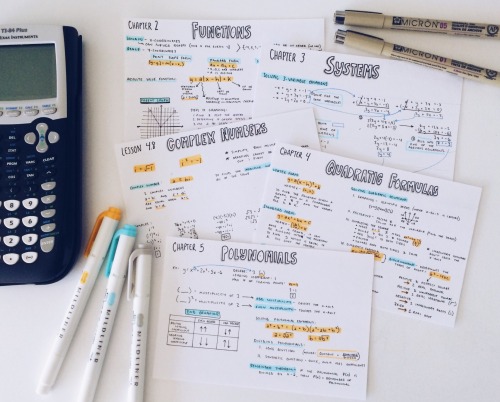
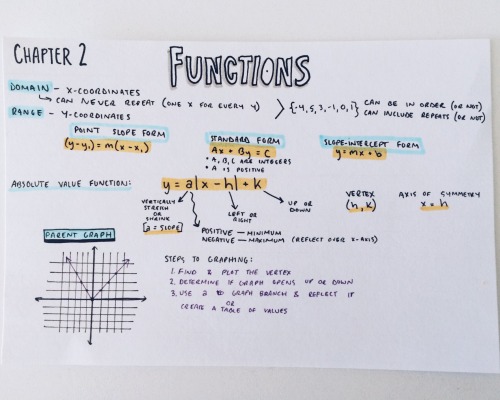
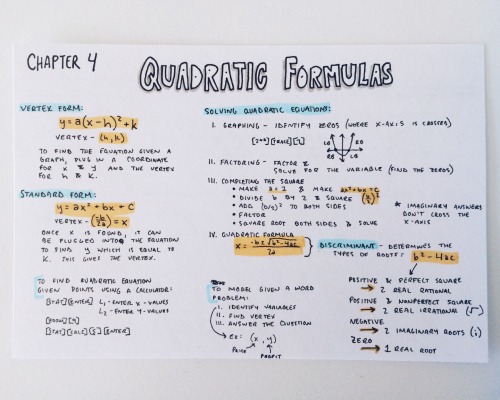

january 17, 2016 / 12:34 // reviewing algebra II
More Posts from Swirlspill-study and Others
To all my freshman babies who are panicking right now about how much your college textbooks cost: Yeah, you’re right, that’s some highway robbery. No, you don’t have to lie down and take it. You have options. Follow my advice and fly on your own debt free wings.
1. Forgoe the bookstore entirely. Sometimes you can get a good deal on something, usually a rental, but it’s usually going to be considerably more expensive to go through official channels. Outsmart them, babies.
2. Does your syllabus call for edition eight? Get edition seven. Old editions are considered worthless in the buyback trades, so they sell for dirt cheap, no matter how new they are. It’s a gamble, sure; there might be something in edition eight you desperately need, but that never happened to me. However, I’ve only ever pulled this stunt for literature/mass comm/religious studies books, so I don’t know it would work in the sciences.
3. Thriftbooks.com, especially for nonfiction and fiction. Books are usually four or five dollars unless they’re really new, and shipping is 99 cents unless you buy over 10$ in books, in which case shipping is free.
4. Bigwords.com. It will scan every textbook seller on the internet for the lowest price available, and will do the same to find the highest price when you try to sell your books back at the end of term. Timesaver, lifesaver.
5. In all probability, your library offers a service called interlibrary loan which is included in your tuition. This means if your library doesn’t carry a book you can order it for free from any library nationwide in your library’s network and it will be shipped to you in a number of days. Ask a librarian to show you how to search for materials at your library as well as though interlibrary loan; you’ll need to master this skill soon anyway. If you get lucky you can just have your required reading shipped to you a week before you need to start reading, then renew vigorously until you no longer need to item. I’m saving over 100$ on a History of Islam class this way.
You professors might side-eye you for bringing an old edition or a library copy, but you just smile right back honey, because you can pay your rent and go clubbing this month. You came here to win. So go forth and slay.
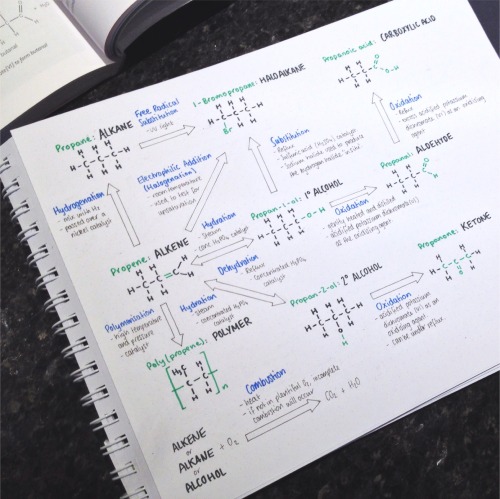
20.3.16// I made a poster on all the organic chemistry reactions we’ve covered so far in the year. It’s a great summary sheet which should be useful come exam time!
How to Read From a Textbook
Hi guys! So I’ve noticed that a lot of people, including myself, struggle with reading directly from a textbook and actually retaining all of the information.
Well my friends I am here to change that [queue the victory music]. Recently I discovered a reading strategy known as the SQ3R technique. It stands for Survey, Question, Read, Recite, Review. I’ve found this technique to be extremely helpful when it comes to reading through textbooks, and so now I’m passing this information onto my dear followers.
1. Survey
The first step in this process is to get a basic idea of what you’re going to be reading. Most textbooks have chapter outlines or a brief summary at the beginning of each chapter. Take about five minutes to skim through these. By doing this, you’ll have the basic structure of what you’ll be learning in your head.
2. Question
This step will be repeated multiple times throughout your reading, so pay attention! Within each chapter, there are section titles that give you a vague idea of what the next few paragraphs will be about. This step asks that you turn the section title into a question. For example, we’ll say that our section title is “The Changing Role of the States.” You can turn this into questions such as “how did the role of the states change” and “which states changed and how.” When you turn the titles into questions, you end up looking for the answers while you’re reading rather than simply reading. This stops you from reading the same line over and over again.
3. Read
This one’s the obvious one. Read your textbook. Take notes while you’re reading. Write down all the important definitions, concepts, names, dates, etc. But remember to take breaks! Taking a three minute break for every twenty minutes of reading allows information to settle in your brain. It also helps with memory retention.
4. Recite
I’ll admit I’m still a bit uncomfortable with this step but it’s helped me a lot with remembering what I’ve read. Basically, this step asks you to summarize what you’ve just read out loud. I do this after each section, and then I summarize the whole chapter once I’ve finished the chapter. (Pro Tip: If you’re uncomfortable with talking to yourself, try talking to a recording device or summarize to a nearby friend.)
5. Review
Review, review, review. I cannot stress this enough. Read over your notes the day after, then the week after. Studies show that you remember 60% more of the material you learned when you review it the next day. Don’t forget you can review with more than just your notes! Make flashcards or foldables with the most important information in the chapter and quiz yourself! So many textbooks have quizzes online for each chapter, so use them!!!! I find mind maps to be super helpful in studying too. Reviewing is a super important step, so don’t think that you can forget about studying just because you’ve read through a chapter!
I might include that, as of recent, many professors have been saying that there is a fourth ‘R’ to this process: Relate. With this step you simply relate the information you’ve just read back to something important in your life. When you make connections with your reading, it becomes easier to remember the material.
Well that’s all I’ve got for you guys for now. I hope this helps at least a few of you. Keep on studying guys, and good luck on finals! ╚(•⌂•)╝
ACADEMIC PHRASE BANK MASTERPOST: CONNECTING WORDS FOR ESSAY WRITING
Addition
To begin with,
In the first place,
Firstly,
The first reason
Additionally
Furthermore,
Another reason why
Secondly, Thirdly,
Next,
Pursuing this further,
Also
Lastly, Finally
In the same way,
Comparison
Similarly,
In the same way,
Likewise,
As with,
Equally,
Contrasting
On the same contrary,
However,
Nevertheless,
On the other hand,
Even so
Alternatively
At the same time
Otherwise
Instead
Conversely
Result
Hence
Therefore
Accordingly
Consequently
Thus
As a result
In consequence
For this reason
For this purpose
Time
Meanwhile
Presently
At last
Finally
Immediately
Thereafter
At that time
Eventually
Currently
Subsequently
In the meantime
Importance
Importantly
Especially
Above all
With attention to
Example
For example
For instance
That is
Such as
As revealed by
Illustrated by
Specifically
In particular
For one thing
This can be seen by
An instance of this
Literary
Clarifies
Conveys
Depicts
Demonstrates
Determines
Displays
Emphasizes
Establishes
Explains
Exemplifies
Highlights
Illustrates
Indicates
Potrays
Represents
Shows
Signifies
Suggests
Beginnings/Causes/Effects
Affects
Generates
Ignites
Impacts
Imposes
Influences
Initiates
Introduces
Involves
Launches
Leads to
Presents
Promotes
Prompts
Results in
Summary
In conclusion,
To sum it all up,
To summarize,
In the final analysis
You can see why …
Finally,
To wrap it all up,
Therefore,
In summary,
In short,
In brief,
FREE MEDICAL PDFs
Anatomy:
1–> KLM for Gross Anatomy
2–> Snell’s Anatomy
3–> BD Churassia
4–> RJ Last
5–> Grey’s Anatomy
6–> Langman Embryology
7–> KLM for Embryology
8–> BD For General Anatomy
9–> Dissector
10–> Di Fore Histology
11–> Junqueira’s Histology
12–> Netter Atlas of human Aantomy
Folder link–> https://drive.google.com/open?id=0B3WdpdsqpX0LYV9KQ3lxY29FY28
Physiology:
1–> Guyton
2–> Ganong
3–> Sheerwood
4–> Sembulingam
Folder link–> https://drive.google.com/open?id=0B3WdpdsqpX0LdXlCSjdZM214dEE
Biochemistry:
1–> Harper
2–> Lippincott
3–> Chatterjea
4–> Satyanarayan
5–> Stryer
6–> MRS Biochemistry
Folder link–> https://drive.google.com/open?id=0B3WdpdsqpX0Ld0o3WnhCR2VEczg
Pathology:
1–> Big Robins
2–> Medium Robins
3–> Pathoma
4–> Goljan
5–> Harsh Mohan Pathology
6–> Atlas of Histopathology
7–> Levinson
8–> MRS microbiology
9–> Microbiology by Jacquelyn G. Black
10–> Color Atlas of Microbiology
11–> Kaplan Pathology
Folder link–> https://drive.google.com/open?id=0B3WdpdsqpX0LYkRYdjFrTm5MR0U
Pharmacology:
1–> Big Katzung
2–> Mini Katzung
3–> Kaplan Review
4–> Lippincott
5–> Pocket Katzung
6–> Rang and Dale’s Pharmacology
7–> Atlas of Pharmacology
Folder link–> https://drive.google.com/open?id=0B3WdpdsqpX0LMkE1UUVRZGwtTlU
Forensic Medicine:
1–> Simpson’s Forensics
2–> Krishan’s Forensics
3–> Atlas of Autopsy
4–> Atlas of Forensic Medicine
Folder link–> https://drive.google.com/open?id=0B3WdpdsqpX0LQXVwOGoyWnFSV2s
Ophthalmology:
1–> Jogi
2–> Jatoi
3–> Parson’s Textbook of Eye
4–> Kanski
5–> AK Khurana
6–> Atlas of ophthalmology
Folder link–> https://drive.google.com/open?id=0B3WdpdsqpX0LOHc5WVZMdkJjX2M
Otorhinolaryngology:
1–> Dhingra
2–> Logans Turner
3–> Color Atlas of Otorhinolaryngology
4–> Maqbool’s Text Book of ENT
5–> Clinical Methods in ENT by PT Wakode
6–> ENT at a Glance
Folder link–> https://drive.google.com/open?id=0B3WdpdsqpX0LaDY2a0lFNDlfTGc
Community Medicine:
1–> Monica’s Text Book Community Medicine
2–> Mahajan And Gupta Text Book of Community Medicine
3–> Bancroft’s Text Book of Community Medicine
Folder link–> https://drive.google.com/open?id=0B3WdpdsqpX0Lc1RCMml2NjhFNjA
Internal Medicine:
1–> Churchill’s Pocketbook of DD
2–> MTB Step 2 Ck
3–> Davidson Essentials
4–> Davidson Principals and practice
5–> Harrison’s Internal Medicine
6–> Internal Medicine USMLE Nuggets
7–> Internal Medicine on call bt LANGE 8–> Oxfords Specialties
Folder link–>https://drive.google.com/open?id=0B3WdpdsqpX0LeEFJNG5TMlc4eWc
Surgery:
1–> Bailey_love short practice of Surgery
2–> Churchill’s pocketbook of Surgery
3–> Deja Review of surgery
4–> Farquharson’s Textbook of Operative General Surgery
5–> Hamilton Bailey’s Physical Signs
6–> Oxford Handbook of Clinical Surgery
7–> Schwartz’s Principles of Surgery
8–> Macleod’s Clinical Examination
9–> Macleod’s Clinical Diagnosis
Folder link–>https://drive.google.com/open?id=0B3WdpdsqpX0LRFpFSG5hZ1pVWkE
Obstetrics & Gynecology:
1–> Case Discussions in Obstetrics and Gynecology
2–> Deja Review of Obstetrics Gynecology
3–> Obstetrics by Ten Teachers
4–> Gynaecology illustrated
5–> Gynaecology by Ten Teachers
Folder link–>https://drive.google.com/open?id=0B3WdpdsqpX0LMU1LRjFDa1FrbjA
Pediatrics:
1–> Nelson Essentials of Pediatrics
2–> Nelson Complete
3–> Pediatrics Review
Folder link–>https://drive.google.com/open?id=0B3WdpdsqpX0LUkdTQkVuNV92Yzg
I hope this helps everyone, it’s not mine. But has been shared to me and I am sharing this with all of you.

01.14.16 4/100 days of productivity
Making study notes for my Abnormal Psychology midterm on Monday~ My hand is cramping 😭

Read JY Yang’s “Waiting on a Bright Moon”, a story of rebellion among far-flung colonies united by song magic.
Xin is an ansible, using her song magic to connect the originworld of the Imperial Authority and its far-flung colonies— a role that is forced upon magically-gifted women “of a certain closeness”. When a dead body comes through her portal at a time of growing rebellion, Xin is drawn deep into a station-wide conspiracy along with Ouyang Suqing, one of the station’s mysterious, high-ranking starmages.
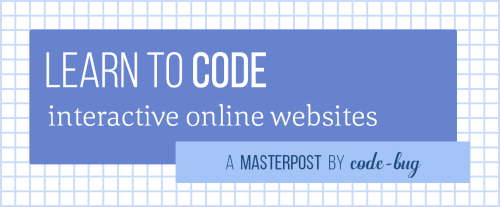
I was asked to make a masterpost on websites like Codecademy, so I’ve tried to compile a list of the best (and mostly free!!). In no particular order:
1. Codecademy [x]
I couldn’t not include Codecademy! Just in case you haven’t checked it out, it’s pretty neat. It has courses for learning languages and web developer skills.
Languages: Python, Ruby, Java, PHP, jQuery, JavaScript, HTML/CSS
Extras: Git, SQL, Command Line, AngularJS, Ruby on Rails
2. Code School [x]
This is pretty similar to Codecademy with the in-browser coding and such. It also has additional features like teaching videos. A good introduction to programming languages.
Languages: Python, Ruby, Javascript, HTML/CSS
Extra: iOS development with Objective-C or Swift, Git, SQL
3. Learnaroo [x]
Has tutorials followed by mini challenges based on the concepts you’ve just learnt! It also has some reference pages called “Learn x by Example”. Looks pretty good.
Languages: Python, Java, Ruby, HTML/CSS
Extra: Algorithms, Mathematics, + a bunch of premium membership stuff
4. Learn …
A set of related websites (see below) which have mini tutorials on language concepts followed by mini challenges, similar to Learnaroo.
Languages: Python, Java, C, C#, JavaScipt, PHP, Shell
5. Code Combat [x]
Basically, it turns learning to code into a game! As you move through the levels, new concepts are introduced, so the code you need to write to play the game gets harder.
Languages: Python, Java, JavaScript, CoffeeScript, Clojure, Lua
6. Codingame [x]
Similar idea to Code Combat, but a little more advanced.
Languages: Python, Java, Ruby, C, C++, C#, Haskell, VB … there’s actually loads it supports.
7. Code Wars [x]
This is more for ‘training’ with a language you already know. It offers plenty of practice through challenges, so it’s really good for improving your coding skills.
Languages: Python, Ruby, Java, C#, Haskell, JavaScript, CoffeeScript, Clojure
8. Coderbyte [x]
This offers some video tutorials and challenges for a few languages, plus special courses on specific algorithms and bootcamp/interview prep. You need a premium membership for quite a lot of things, though (e.g. I don’t think you can watch any of the videos with a free membership).
Languages: Python, Ruby, JavaScript
Extras: Algorithms, Bootcamp Prep, Job Interview Prep
9. Free Code Camp [x]
Mini tutorials followed by mini challenges. Has a number of courses on the languages below!
Languages: HTML/CSS, jQuery, JavaScript
Extras: Git, Algorithms, + a bunch of projects to complete
10. Programmr [x]
Has courses to learn various languages through doing little exercises/challenges in the browser, similar to previous examples. Also has ‘zones’ for more languages, where you can find challenges, example code and projects people have shared.
Languages: Python, Java, C++, C#, PHP, jQuery
11. CheckIO [x]
Only offers Python, but I still think it’s really great. You move from level to level, getting challenges which are gradually trickier. Learn by doing!
12. Rails for Zombies [x]
For people who already know a bit of Ruby, but nothing about Ruby on Rails! Each level begins with a short video followed by interactive challenges where you program Rails in the browser.
That’s all (for now!) Hope this is helpful! (ノ^∇^)ノ゚
ewwwwwwwwwwwwwwwwwwwwwwwwwwwwwwwwwwwwwwwwwww
writing adult emails is awful
its like
hi [name of person],
this formatting is making me uncomfortable but I have to tell you something / ask you something that is vital to my career as a student.
I re-read and edited that sentence for an hour, but you’ll probably just glance over it for half a second.
thanks!
- [name]
-
 dandyboystudies liked this · 3 years ago
dandyboystudies liked this · 3 years ago -
 the---king liked this · 4 years ago
the---king liked this · 4 years ago -
 httpsstudy reblogged this · 4 years ago
httpsstudy reblogged this · 4 years ago -
 gatavanidosablog liked this · 4 years ago
gatavanidosablog liked this · 4 years ago -
 the-ghost-of-mona-lisa liked this · 5 years ago
the-ghost-of-mona-lisa liked this · 5 years ago -
 croissantgoblin liked this · 5 years ago
croissantgoblin liked this · 5 years ago -
 tadpoe7 liked this · 5 years ago
tadpoe7 liked this · 5 years ago -
 jameshpuff liked this · 5 years ago
jameshpuff liked this · 5 years ago -
 chebean19 liked this · 5 years ago
chebean19 liked this · 5 years ago -
 midnightglow liked this · 5 years ago
midnightglow liked this · 5 years ago -
 onetwostepbacks liked this · 5 years ago
onetwostepbacks liked this · 5 years ago -
 romantik333 reblogged this · 5 years ago
romantik333 reblogged this · 5 years ago -
 romantik333 liked this · 5 years ago
romantik333 liked this · 5 years ago -
 hepburnstudy liked this · 6 years ago
hepburnstudy liked this · 6 years ago -
 almamiaamaelcafe liked this · 6 years ago
almamiaamaelcafe liked this · 6 years ago -
 sp-ainel reblogged this · 6 years ago
sp-ainel reblogged this · 6 years ago -
 sp-ainel liked this · 6 years ago
sp-ainel liked this · 6 years ago -
 smartwhitedad reblogged this · 6 years ago
smartwhitedad reblogged this · 6 years ago -
 studymuses-blog liked this · 6 years ago
studymuses-blog liked this · 6 years ago -
 aliceslices liked this · 6 years ago
aliceslices liked this · 6 years ago -
 smartwhitedad reblogged this · 6 years ago
smartwhitedad reblogged this · 6 years ago -
 remotelearning liked this · 6 years ago
remotelearning liked this · 6 years ago -
 xxvfboi98xx-blog liked this · 6 years ago
xxvfboi98xx-blog liked this · 6 years ago -
 pizza-and-studying reblogged this · 6 years ago
pizza-and-studying reblogged this · 6 years ago -
 pizza-and-studying liked this · 6 years ago
pizza-and-studying liked this · 6 years ago -
 freak-fox0003 liked this · 6 years ago
freak-fox0003 liked this · 6 years ago -
 mindlessblog liked this · 6 years ago
mindlessblog liked this · 6 years ago -
 mitzircle liked this · 6 years ago
mitzircle liked this · 6 years ago -
 dopecloddreameralmond reblogged this · 6 years ago
dopecloddreameralmond reblogged this · 6 years ago -
 dopecloddreameralmond liked this · 6 years ago
dopecloddreameralmond liked this · 6 years ago -
 deborahdeshoftim5779 reblogged this · 6 years ago
deborahdeshoftim5779 reblogged this · 6 years ago -
 deborahdeshoftim5779 liked this · 6 years ago
deborahdeshoftim5779 liked this · 6 years ago -
 bungalobabey liked this · 6 years ago
bungalobabey liked this · 6 years ago -
 fadingintoart liked this · 6 years ago
fadingintoart liked this · 6 years ago
a study blog for collected references, advice, and inspiration
267 posts



